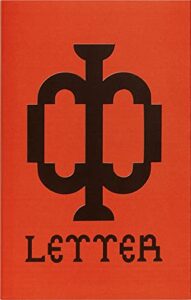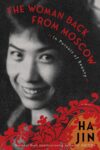
[Isolarii; 2020]
Unfamiliar with the general landscape of mid-20th c. and contemporary Russian poetry, I am not qualified to assess this anthology with the depth it deserves: a thorough comparison of the authors included here and those not included against the background of Russian poetry in general. Nor can I assess the accuracy of the translations (performed by seven Russian and non-Russian translators). I take seriously Eugene Ostashevsky’s reproof of monolingual American poets (both “imperialist and provincial”) in his introduction to his translation of Galina Rymbu’s Life In Space. So why write about this anthology when it can only amount to either an uninformed putdown or an extended blurb? The only response I have to that question is my enthusiasm — I read the collection in less than a day — and the fact that its foreword is written by Eileen Myles. Yet that in itself raises another question. As I am part of Myles’ generation (only eight years separate us), one might legitimately wonder if our combined interest in, enthusiasm for, this project is related to the way these “feministive” poets (those who “feminize” Russian nouns gendered male, roughly equivalent to using “actress” for “actor”) touch the heartstrings of our mutual youth, those halcyon days of Second and Third Wave feminism that shook the landscape of American and European culture and poetry during the Sixties and Seventies. And since I “identify” (a problematic term, to say the least) as a cis-heterosexual African American male, the possibility of tourist exoticism, per Ostashevsky’s critique, can never be entirely ruled out. All that said, I love this fucking book.
My enthusiasm aside, the issue of nostalgia is crucial since the feminist movement in Russian poetry (and more widely, perhaps, in Russian culture) can only appear as a belated eruption of consciousness from the point of view of the West. Yet, despite some general degrees of progress regarding the rights of women in the Western hemisphere (e.g., Argentina’s recent legalization of abortion), the issues that Alice Walker, Adrienne Rich, Audre Lorde and others confronted half a century ago remain all too relevant today. Thus, even if one pretended to assess this anthology through the apparently neutral language of “uneven development,” the fact remains that the bitterness, anger, and affirmative courage that animates this sampling of Russian feminist poetry can also be found in the contemporary American poetry of, for example, Wendy Trevino, Duriel Harris, Cassandra Troyan, Dawn Lundy Martin, and Jennifer Tamayo.
Still, as one of the founding members of the online feminist journal F pis’mo, editor and poetess Rymbu explicitly acknowledges the historical lag of Russian feminist poetics and poetry, noting that while there were “exceptional figures” like Anna Alchuk and Marina Temkina before the end of the 20th c., most Russian women poets from the 19th and early 20th centuries — e.g., Anna Akhmatova — identified with the patriarchal traditions of Russian literature. Thus, Rymbu’s use of the term poetess (poetessa in Russian) can be understood as a point of departure and marker of difference from the patriarchal literature of her country. In their foreword, Eileen Myles writes that “there are lines like a curse that yodel radiantly out of the toothy mouth of the curser . . . lines that are just so fucking metonymic in their grace . . . I’ve been invited to witness. To smell the crowd and be charged by history.” On the other hand, the translators write that, “this poetry’s brilliance lies in its rhythm, energy, and depth of emotion — in its universal relevance rather than applied politics.” This latter statement seems designed to redirect, if not entirely blunt, the power of the rhetoric and relentless energy of the poems included here, to market the anthology beyond its specific Eastern Europe feminist contexts. Rymbu contradicts this apparent depoliticization of the poets writing under the sign of feminitives: “For us, literature is not just a space for self-expression and linguistic innovation — it is also a platform of the political struggle for a better world.” Linking linguistic simplicity to political and cultural authoritarianism (“Authoritarianism in language, politics, and life practices embodies just this kind of simplification, the reduction of multiple meanings to one, and this gives rise to violence”), Rymbi insists that, “For us, poetry is a language practice that constantly evades finalized meanings.” Thus pollical activism and linguistic innovation are interwoven, which may be why Rymbu concludes her introduction with an approving nod to the metaphors of weaving deployed by the feminist writer Sadie Plant:
Some of the most crucial metaphors of contemporary feminist philosophy and art, which have been highlighted by Sadie Plant, among others, are “plaiting,” “nets,” “weaving,” “connectivity.” These concepts are likewise important in writing: what if we examine feminist, women’s, and queer writing through a metaphor of threads, textures, fabrics, beading, knitting, patterns? The tense knots of pain and meaning in the dense fabric of feminist writing bear tiny grains of transformation within.
***
The anthology proper begins with the oldest poet of the group, Lida Yusuprova (paid homage to in a couple of poems here). Her descriptions of the matter-of-fact sexual violence against Russian women, the ensuing blaming of self (and excuses for the perp), move seamlessly from traditional lineation and stanzaic form to a concrete mural of dumbstruck outrage that we might understand as the opposite of, for example, Molly Bloom’s exuberant yesses that conclude James Joyce’s Ulysses:
if the teen had been home Mateyuk would
not have raped me
bad luck
and when he came back he lay down on top
of me without saying anything and sex
happened with us I didn’t resist I just
said this isn’t right I repeated this isn’t
right this isn’t right this isn’t right this
isn’t right this isn’t right this isn’t right
this isn’t right this isn’t right this isn’t
right this isn’t right this isn’t right this
isn’t right this isn’t right this isn’t right
this isn’t right this isn’t right this isn’t
right this isn’t right this isn’t right this
isn’t right this isn’t right this isn’t right
this isn’t right this isn’t right this isn’t
right this isn’t right this isn’t right this
isn’t right this isn’t right this isn’t right
this isn’t right this isn’t right this isn’t
right this isn’t right this isn’t right this
isn’t right this isn’t right this isn’t right
this isn’t right this isn’t right this isn’t
right this isn’t right this isn’t right this
isn’t right this isn’t right this isn’t right
this isn’t right this isn’t right this isn’t
right this isn’t right this isn’t right this
isn’t right this isn’t right this isn’t right
this isn’t right this isn’t right this isn’t
right this isn’t right this isn’t right this
isn’t right this isn’t right this isn’t right
In several of these poets’ work the body — female and male — itself is described with an undisguised disgust which, in Lolina Agamalova’s poetry, for example, is linked to the economic power of male regeneration (“your lips blue either from cold or wine/ my cunt like eaten away on the inside by mold/what would it be like/ if out on the street they didn’t tender you/ sperm . . . ”). For Elena Kostyleva, the well-worn trope of male desire is inextricable from its unchecked political valency: “I WANT ONLY YOU AND THE/ TORTURE OF GAYS/ ONLY YOU, CHECHNYA.” However, the two poets with the longest and most thoroughgoing works included here — Oksana Vasyakina and Galina Rymbu — demonstrate that the long narrative (each poet’s long poem is over, respectively, twenty and thirty pages) is capable of reaching meditative insight and lyric intensity without disrupting the seeming endless stream of words. Vasyakina’s poem, narrated from the perspective of a female bookstore owner, is both a memoir of the narrator’s father and a fantasy of revenge against the country’s fathers and their female abettors. For example, in one section of the poem “These people didn’t know my father,” Vasyakina wonders if the pen can literally be transformed into a power mightier than the sword by means of camouflage:
I often imagine that instead of books I’m
hauling
dynamite
I store it specifically for the secret terrorist
organization
of women and children struggling against
patriarchy
In Galina Rymbu’s long poem, “Summer. Gates of the Body,” we return to the deromanticized, half-starved, body (“he’s hungry, I’m hungry, they are hungry./ almost the whole world is hungry.”), reduced to the scuffling of animal parts and objects:
my clitoris resembles the snout of an
anteater, your thing is
made of warm marble in summer. when we
are together — something’s off
But even this reductionism isn’t the final stage of dehumanization. At one point in the poem the appendages of an animal take on their own independent agency:
paws live their own life: they write at night,
on the toilet,
in the tram, in the hotel, in the middle of a
street, even in bed. rush,
paws, so much to do.
But Rymbu reminds us that animals, at the very least, act on instinct, understand how to fight back. As such, then, they offer a model for the vulnerable:
paws, perhaps, like a racoon’s —
swift, fidgety
yet if someone comes and does
what father did, what boys did at school,
and guys
from the neighborhood, total
strangers, drunk friends and poets,
I know
I have claws, I’d say, razor-sharp,
they would tear his body, release his
blood,
even if even if they’re scared. little
paws.
For all this, Rymbu can still imagine a different world, one “where food and things create themselves,/a world of different labor.” And though the Orwellian nightmare has come to fruition in contemporary Russia (“we animals, we herds of autonomy.”), Rymbu, like all the poets included in the anthology, remains undeterred in her forward-looking vision. In the only poem in the anthology that directly addresses the prohibition against abortion, Rymbu’s sardonic take on the state and its institutional “partners” in “My Vagina” is inspiring:
I didn’t know then that everyone had an
interest in my vagina:
the state, my parents, gynecologists, strange
men,
Orthodox priests with epaulets under their
robes
and women’s blood on their robes,
employers, anti-extremism agents, the
military, fascists, immigration cops,
banks, conservative critics of ‘depraved
lifestyles,’
patriotic cultural figures, appropriators of
traditional values,
washed down with brandy.
Collectively, the poets in F Letter, which also include Yulia Podlubnova, Elena Georgievskaya, Stanislava Mogileva, Ekaterina Simonova and Nastya Denisova, would doubtlessly endorse Rymbu’s all too familiar battle cry: “To make revolution with the vagina. / To make freedom with oneself.” Even for non-Russian language readers like me (every translated poem in the anthology is accompanied by the original Russian), this sentiment remains inspiring, perhaps enough to begin to learn, at the very least, the Cyrillic alphabet. Above all, F Letter: New Feminist Russian Poetry demonstrates that the feminist movement in general continues to spread and develop across the globe. Moreover, this anthology offers a glimpse into the ongoing transformations of heretofore patriarchal cultural traditions.
Tyrone Williams teaches literature and theory at Xavier University in Cincinnati, Ohio. He is the author of several chapbooks and six books of poetry: c.c. (Krupskaya 2002), On Spec (Omnidawn 2008), The Hero Project of the Century (The Backwaters Press 2009), Adventures of Pi (Dos Madres Press 2011), Howell (Atelos Books 2011) and As Iz (Omnidawn 2018). A limited-edition art project, Trump l’oeil, was published by Hostile Books in 2017. He and Jeanne Heuving edited an anthology of critical essays, Inciting Poetics (University of New Mexico Press, 2019). His new website is at https://www.flummoxedpoet.com/
This post may contain affiliate links.







